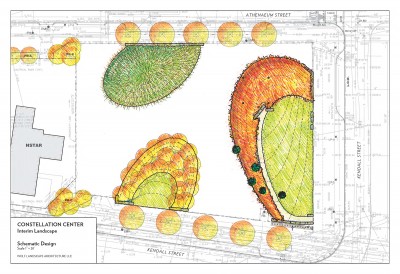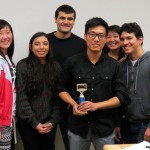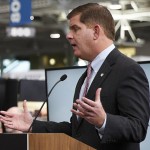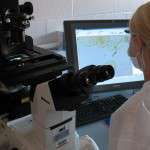
The concept of a “pop-up park” sounds like a stunt Leslie Knope would pull in “Parks and Recreation,” but very soon will be an addition in Cambridge.
Glenn KnicKrehm, owner of an acre of property in Cambridge’s Kendall Square, recently announced his plans to build a temporary park on the land that will one day be home to a state-of-the-art performing arts complex called the Constellation Center. The park will provide a tasteful alternative for the fenced-off and empty lot until sufficient funds can be raised to start the Center’s construction.
KnicKrehm, president of the Constellation Center, decided he wanted to bring high-quality performance art spaces to the greater Boston area after revisiting his favorite Los Angeles movie theaters from his youth.
“It’s a very prominent site,” KnicKrehm said. “We have long had an idea to use the site in some way that is compatible with the rather complicated regulatory environment of the land.” Recognizing his duty to be a “good neighbor,” KnicKrehm said he wanted to use the lot in a way that would contribute to the area, at least until the Constellation Center can be built.
It hasn’t been a simple project. Eighteen years of surveying over 7,000 consumers, artists and producers was only a portion of the preparations for the project, KnicKrehm said. He and his team have conducted research into everything from acoustics to coat rooms, designing a hub that will provide patrons with five performance venues to host everything from opera and dance to symphonies, concerts and movie screenings with films from the Constellation Center Film Archive.
Now, all that’s left is to fundraise the money to construct it.
“We bought it [the property] when there was only one other building in the whole area,” KnicKrehm said. “It was a vast parking lot.”
Since then, buildings have sprung up on all sides, and most of the surrounding blocks have been developed.
John Weis, a lecturer in the city planning and urban affairs program in Boston University’s Metropolitan College, said he and his students analyzed KnicKrehm’s property and a nearby parcel of land this past semester.
“One of the things that we discovered in our analysis was that Kendall Square is really an incredibly dynamic entrepreneurial area,” he said.
KnicKrehm worked closely with the City of Cambridge to come up with uses for the lot. For the last several years, local artist Pablo Eduardo’s sculpture “Las Furias” has been on display in the lot, but KnicKrehm and the city have agreed that something more is necessary.
Recent testing of the site, which once held a manufactured gas plant, determined that it is finally safe to remove the fence, allowing KnicKrehm to construct a temporary greenspace.
“We hired a landscape designer, Tobias Wolf [of Wolf Landscape Architecture], and we went through a number of different iterations, a number of different design options,” KnicKrehm said. “The city was very closely involved in that.”
The final design is handicap-accessible and features colorful, quick-growing, low-maintenance plants and flowers. “Las Furias” will remain, incorporated into the plan.
“Having parks in cities, temporary or permanent, is a wonderful idea,” said Melanie Hall, an associate professor in the history of art and architecture department in the College of Arts and Sciences. “They act as lungs for cities and help to bring a better atmosphere, not only in terms of air quality but also quality of life.”
The Cambridge community agrees, KnicKrehm said, although it isn’t giving the all-clear until the project is more concrete.
“The city has given us this preliminary green light, but they have not given us the final documentation,” KnicKrehm said.
He doesn’t know if that approval will come tomorrow or in months, but he said he is ready to start whenever they get that final approval. The construction itself should take about three and a half years to complete — if the community allows it.
“As soon as a city does a popup park … the community wants to keep it as a park,” Weis said. “They don’t want to see development because most people think that’s a negative.”
KnicKrehm said he has worked closely with the city to make sure the park is presented as a temporary installment from the beginning, a placeholder for something bigger to come.
“We early on made the decision that we had to do this right,” KnicKrehm said. “In order to get it right, it will take time.”




